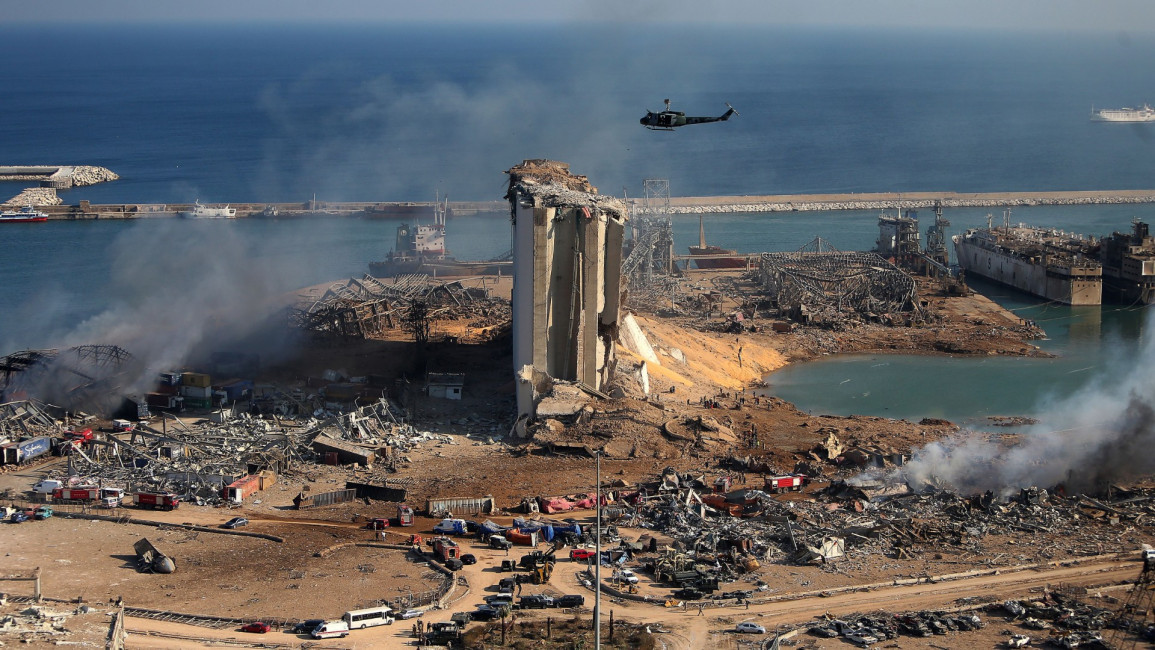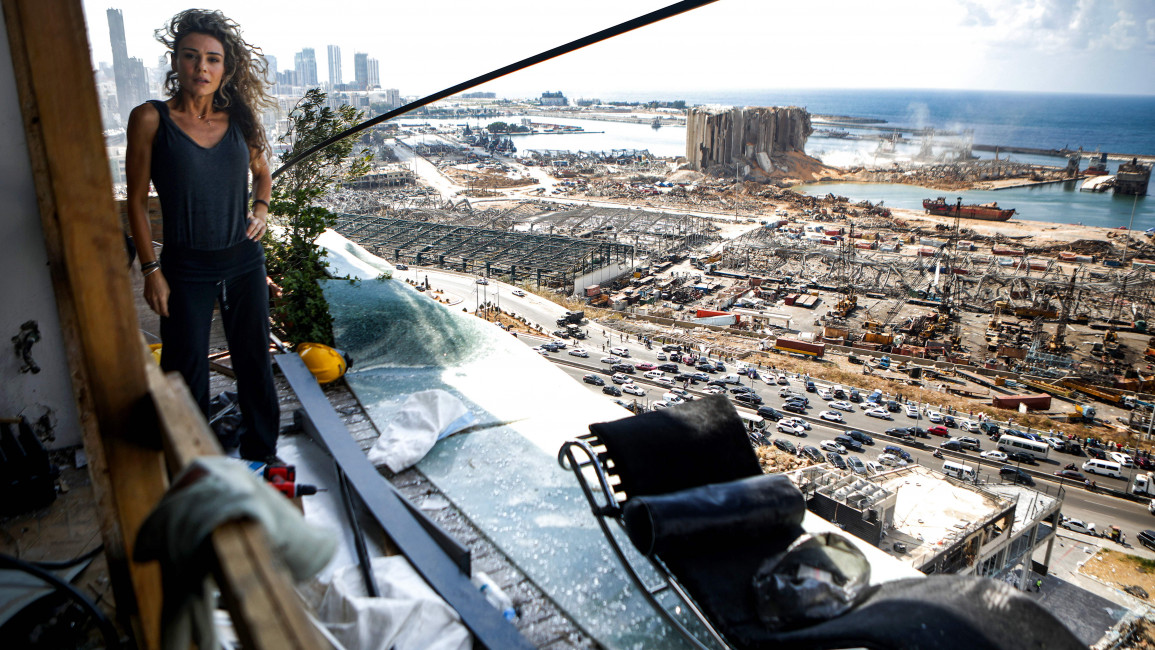
Two years on, Beirut port blast survivors turn to international community for justice

Two years ago, 2,750 tons of ammonium nitrate exploded in Beirut’s port, killing over 220 and wounding 7,000. Then Lebanese Interior Minister Mohammed Fehmi promised those responsible would be held to account “within five days”.
Two years later, no one has been charged in connection with the port blast and the domestic investigation has been effectively stalled.
With nowhere else to look, a coalition of human rights organisations and survivors of the port blast has turned to the international community for justice.
“After two years of the failure of the domestic investigation, we call for an independent, impartial fact-finding mission to investigate the Beirut port blast explosion,” Antonia Mulvey, executive director of Legal Action Worldwide, a member of the coalition, said on 3 August.
"Two years later, no one has been charged in connection with the port blast and the domestic investigation has been effectively stalled"
The coalition called for a resolution to be introduced at the UN Human Rights Council (UNHRC) in September to dispatch a fact-finding mission to Lebanon to investigate the port blast.
Survivors of the Beirut port blast and legal advocates have said that the domestic investigation – which has been blocked since December 2021 – can no longer achieve accountability on its own.
“So many levels of authority in Lebanon … so many people knew that the ammonium nitrate was there. So why would these people who were so clearly accountable, allow the investigation to proceed?” Sarah Copland, a UN officer who lost her son Isaac in the port blast, told The New Arab.
The investigative judge in charge of the domestic probe, Judge Tarek Bitar, has issued warrants and summons for officials such as former Lebanese PM Hassan Diab and the head of the security directorate Abbas Ibrahim.
Police have refused to execute these warrants, and suspects have filed more than 25 lawsuits alleging “political bias” which have forced Bitar to stop his investigation. Most recently, the Ministry of Finance has refused to sign off the funding necessary to allow the investigation to continue.
“An international investigation, such as those conducted by the UNHRC, will be completely independent. They will be able to find the truth in a way that the domestic investigation will not,” Copland said.
An international fact-finding mission would not replace but assist the domestic investigation. Its results could be drawn upon by Lebanon’s own domestic investigation as evidence.
|
|
The international community … does it care?
Just two days after the Beirut port blast, French President Emmanuel Macron visited Beirut. He walked the streets of the shattered city and met with ordinary citizens, and called for an “international and transparent probe” into the events of 4 August.
He promised a “new political pact” which would replace the old sectarian system, originally designed by France when it colonised Lebanon.
Despite the rhetoric and photo ops, however, Macron has not pushed for an international effort towards accountability.
“One of the main obstacles to this international investigation has unfortunately been France. France has been unwilling to support an [international investigation] at the UNHRC,” Aya Majzoub, a researcher at Human Rights Watch, told The New Arab.
"With nowhere else to look, a coalition of human rights organisations and survivors of the port blast has turned to the international community for justice"
Member states of the UNHRC must vote to pass a resolution which establishes the fact-finding mission for the Beirut port blast case. Lebanon would not need to give permission for the investigation to proceed.
“What’s even more troubling is that other states are reluctant or refusing to move forward with such a resolution without France’s support, because of what they call France’s ‘special relationship’ with Lebanon,” Majzoub said.
Though civil society organisations and survivors of the port blast have called for an international investigation in the past, members of the UNHRC have not heeded their call.
“We’re calling on France to support this initiative, but also on other states to wait for France and not to use France’s colonial history with Lebanon as an excuse to do nothing,” Majzoub said.
What are the chances of success?
Lebanon has had its fair share of international investigations and tribunals. Perhaps most famously, the UN set up the “Special Tribunal for Lebanon,” to investigate and prosecute those responsible for the 2005 assassination of Lebanese PM Rafic Hariri.
The verdict of the tribunal, issued 11 years after its formation, did not lead to any arrests nor definitively concluded who ordered the assassination.
“This experience did not have any positive repercussions on our justice system or on our security agencies,” Ghida Frangeih, the head of research at Lebanese NGO Legal Agenda, told The New Arab.
Accordingly, some Lebanese were initially against an international investigation into the Beirut port blast because of the country’s experience with the Special Tribunal.
|
|
“What we want is that our own judiciary is able to investigate such crimes, because we cannot rely on the international community. However, there is a consensus … that a fact-finding mission from the UNHRC would be beneficial for Lebanon because this would not substitute the national investigation. It would complement it,” Frangieh said.
Despite the mounting frustration over the domestic investigation, some have said that it has uncovered some necessary, but uncomfortable truths about Lebanon’s political and judicial system.
Nizar Saghieh, the founder of Legal Agenda, gave the example of when parliamentarians and officials invoked judicial immunities to protect themselves in the Beirut port blast investigation. It was not until then that he realized “how much immunity there is in this country,” Saghieh said at a legal event on 2 August.
No international investigation could have raised such awareness, he added.
"Anyone who's saying that we still need to wait is just playing politics. Two years is enough to wait for an investigation to be completed"
Worldwide implications for an international probe
In addition to assisting the domestic Lebanese investigation, an international fact-finding mission could help further any court case dealing with the port blast worldwide.
On 11 July, Sarah Copland and eight other plaintiffs filed a case in Texas against the holding group which chartered the ship which delivered the ammonium nitrate to Beirut’s port in 2013.
Their case could draw upon the evidence dug up by an international probe, as could any other future cases filed in non-Lebanese courts.
Still, as the international community takes its time, survivors of the blast worry that justice is becoming harder and harder to achieve.
“The longer it goes on before an investigation is completed, the harder it is to get all the facts. The silos are collapsing as we speak. What evidence is being destroyed that we don’t know of?” Copland said.
“Anyone who’s saying that we still need to wait is just playing politics. Two years is enough to wait for an investigation to be completed,” she continued.
William Christou is The New Arab's Levantine correspondent, covering the politics of the Levant and the Mediterranean.
Follow him on Twitter: @will_christou




